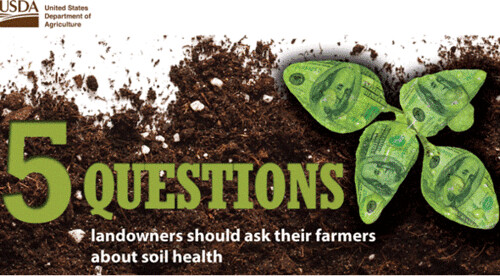By Melissa Erdman, USDA.gov

Do you rent out your land for agriculture? If you do, don’t forget about your farm when you’re making your New Year’s resolutions. Here are five questions from USDA’s Natural Resources Conservation Service (NRCS) that you need to ask the folks who rent your land: Do you build organic matter in the soil? Do you test the soil at least once every four years? Do you use no-till practices? Do you use cover crops? What can we do together to improve soil health on your land?
If you’re lucky, you have a renter like John Z. Beiler who rented acres of prime farmland in Port Royal, Pennsylvania. At the landowner’s encouragement John worked with NRCS to address gully erosion, test the farm’s soils, control noxious weeds and comply with highly erodible land and conservation plan requirements.
practices that included a grassed waterway, a lined waterway, subsurface drainage, an equipment stream crossing and a 35-foot native grass riparian herbaceous buffer.
John also committed to continue no-tilling the farm and planting mixes of diverse cover crops. He had converted to no-till farming long ago and was one of the first farmers in Juniata County to include forage radishes in his cover crop mixes. He did everything he could to build healthy soil on his rented acres.
Sadly, just a few months after implementing these practices, John passed away. A few weeks later, his son, John, went to the local NRCS office to find out how to carry on his dad’s conservation work.
Today, all the practices in the Beilers’ conservation plan are at work. They have an equipment crossing that limits streambank erosion and a native grass buffer on an ag-impaired stream segment that bisects the farm. They continue to test the soils and use no-till and cover crops.
The Beilers have, and are, “building the production capacity and resiliency of their landowner’s soil…resulting in longer-term production and profitability gains through sustainable conservation practices,” according to Barry Fisher, NRCS soil health specialist and an Indiana farmer.
“Finding a farmer who is interested in building organic matter by using practices like no-till and cover crops is like finding a bank with a better rate on a Certificate of Deposit,” said Fisher.
Source:usda.gov